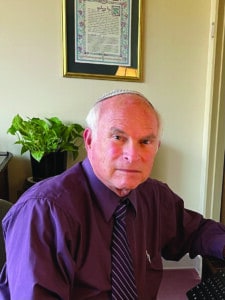Judging by the waiting list of more than 400 people for Dr. Michael S. Weissman, Ph.D.’s outpatient practice, you would think there is a heightened need for mental health services today, and you would be exactly right.
According to the Chesapeake and Norfolk-based psychologist who opened a private practice in 1981, the last three years have felt like a “different era.” A general state of angst, he says, is evident, transforming what used to be a large number of patients with depression and anxiety into patients now presenting with an “overlay” of an overarching sense of “existential questioning.”
“We still dig for what is triggering a person’s distress,” he says. “Before, you could say ‘let’s explore why you are anxious.’ Now, you say ‘of course you’re anxious.’” Weissman helps patients develop tools to find their own purpose and meaning.
There are two major myths people tend to have about therapy before they start.
The first is that it is somehow a weakness or a crutch. That’s flawed, he says, but pervasive. “It’s a huge growth step if a person approaches it the right way: I want to fix it, I want to grow.” While medicine tends to be illness-focused as if something is “broken” and causing a patient to feel they are “defective,” Weissman’s approach is to teach ways of coping that are effective, whether in one’s marriage, work, or for one’s own inner peace. “At some point, everyone has to look at themselves and say ‘I want to change.’ That’s a huge sign of strength.”
The other misconception about therapy is that it’s a passive process; that the therapist will somehow fix you. “This couldn’t be further from the truth. Usually they realize ‘hey, this is not sit back and let the doctor do it.’ It’s a shared journey in mastery helping a person to learn new skills and to develop better character traits. They have to be very active in that process.”
In 2019, Weissman and Rabbi Mordechai Wecker co-authored a book called Therapy According to G-d (Mosaica Press). The idea for the book came at a moment when Weissman was attending Rabbi Wecker’s weekly class on Torah and noticed how integral faith insights from the Torah were to his daily practice (he is a secular practitioner, taking patients of all backgrounds and faiths).
“The book is a reflection of my entire career, but I didn’t know it until I became Orthodox. Both daily life issues and existential questions are best answered by digging into insights from the Torah about purpose, meaning, personal growth, and mortality,” says Weissman.
Even with the present state of the world, Weissman remains optimistic about the mental health field and how people can continue to learn, grow, and heal.
“I’m most hopeful about the significant increase in people who are now seeking help,” says Weissman. “Much of the stigma [over therapy] has softened or gone away. It’s troubling that there is so much need, but more people are trying to find healthier solutions to reducing such symptoms as depression and anxiety rather than resorting to substances or allowing their feelings to manifest in acting-out behaviors. So many people are coming in with frustration and hopelessness watching the world crumble, and they feel ‘so what am I; what’s the point?’ In the Torah, each one of us is responsible for fixing the world through the development of our character traits, how we deal with problems, and how we treat other people.”
Weissman received his undergraduate education at Princeton University in 1970 and earned his Master of Science (1972) and Doctorate (1974) degrees from the University of Massachusetts in the field of Clinical Psychology. He completed a Postdoctoral Fellowship at Upstate Medical Center in Syracuse, New York, before moving to Virginia in 1975 to take a position as the first doctoral level psychologist at Maryview Community Mental Health Center followed by five years at Portsmouth Psychiatric Center. He started his private practice in 1981 which has grown to two locations, one on Colley Ave. in Norfolk, and the main office at Churchland Psychological Center.
–Debbie Burke


